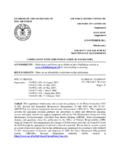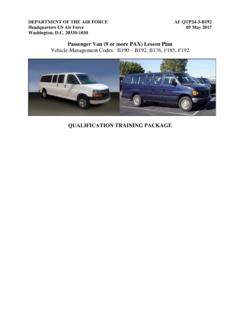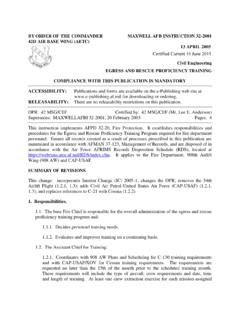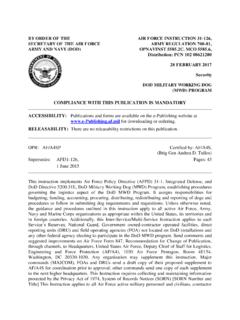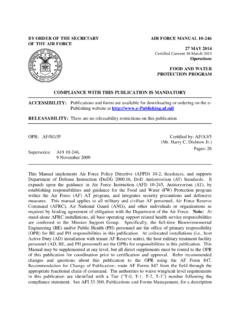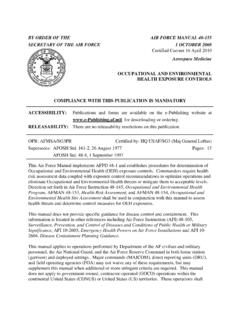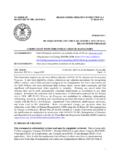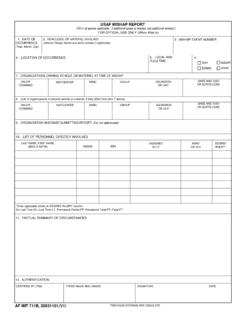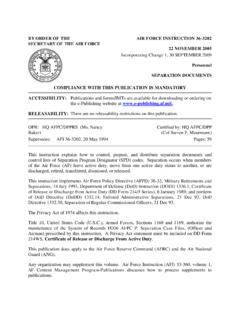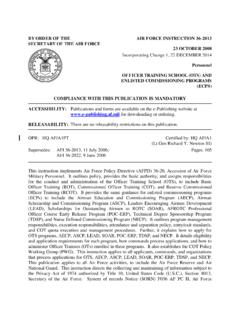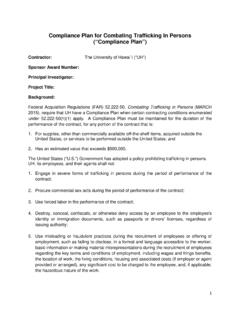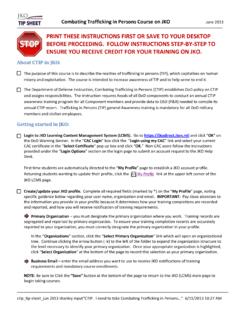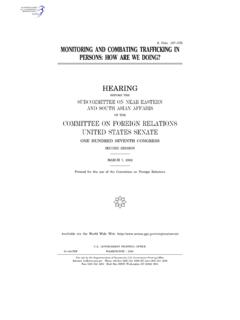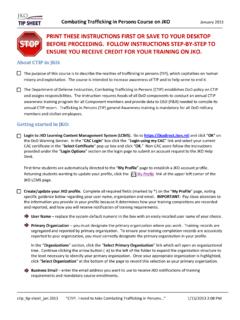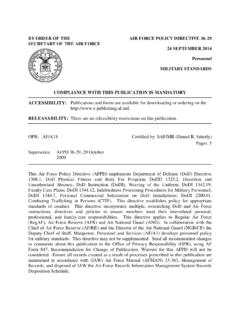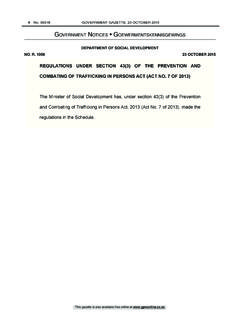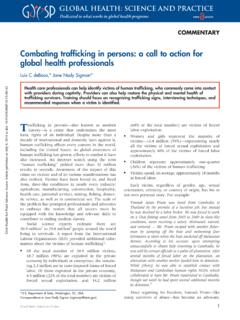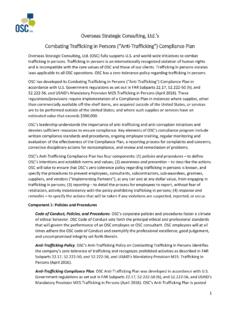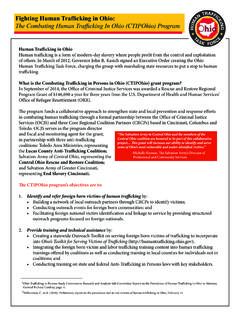Transcription of BY ORDER OF THE AIR FORCE INSTRUCTION 36-2921 …
1 BY ORDER OF THE SECRETARY OF THE AIR FORCE AIR FORCE INSTRUCTION 36-2921 30 AUGUST 2011 Personnel combating trafficking IN persons (CTIP) COMPLIANCE WITH THIS PUBLICATION IS MANDATORY ACCESSIBILITY: Publications and forms are available on the e-Publishing website at for downloading or ordering. RELEASABILITY: There are no releasability restrictions on this publication. OPR: HQ USAF/A1 SRQ Supersedes: , 23 February 2009 Certified by: HQ USAF/A1S (Brig Gen Eden J. Murrie) Pages: 9 This publication implements AFPD 36-29, Military Standards, and Department of Defense INSTRUCTION (DoDI) , combating trafficking in persons . It provides guidance and procedures on the implementation, execution and management of the combating trafficking in persons (CTIP) program. This INSTRUCTION describes Air FORCE responsibilities under the DoDI and establishes the Air FORCE requirement to support the program.
2 This publication applies to Air FORCE (AF) military (Regular, Reserve, Air National Guard) and civilian employees except where noted otherwise. This publication may be supplemented, but all direct Supplements must be routed to the OPR of this publication for coordination prior to certification and approval. Refer recommended changes and questions about this publication to the Office of Primary Responsibility (OPR) using the AF Form 847, Recommendation for Change of Publication; route AF Form 847s from the field through the appropriate functional s chain of command. Ensure that all records created as a result of processes prescribed in this publication are maintained in accordance with AFMAN 33-363, Management of Records, and disposed of in accordance with the Air FORCE Records Disposition Schedule (RDS) located at SUMMARY OF CHANGES This publication has been changed from an Air FORCE Supplement to the DoDI to an Air FORCE INSTRUCTION .
3 Definitions of CTIP have been updated and expanded to include activities such as pandering, prostitution, and patronizing a prostitute even though such activities may be legal within a host nation country, but which are in violation of Title 10 United States Code, Chapter 47. 2 AFI36-2921 30 AUGUST 2011 1. Purpose: Issues INSTRUCTION in accordance with DoDI Establishes Air FORCE policy on CTIP and assigns responsibilities. 2. It is Air FORCE Policy to: Deter activities of Air FORCE Service members, civilian employees, indirect hires, contract personnel, and command-sponsored dependents that would facilitate or support TIP, domestically and overseas. This includes activities such as pandering, prostitution and patronizing a prostitute even though such activities may be legal within a host nation country, but which are in violation of Title 10, United States Code, Chapter 47 (The Uniform Code of Military Justice).
4 TIP also includes forced prostitution, forced labor, and debt bondage. TIP is a grave violation of human rights and a worldwide criminal threat to security, civil rights, and stability as well as a direct threat to our national foreign policy goals. Oppose prostitution, forced labor, and any related activities that may contribute to the inherently illegal activity of TIP as harmful and dehumanizing. TIP is a violation of United States law and internationally recognized human rights and is incompatible with Air FORCE core values. Educate all Service members and Air FORCE civilians annually on the worldwide trafficking menace, national TIP policy, overseas theater TIP policy, and attendant personal responsibilities consistent with Air FORCE core values and ethical standards. 3. Roles and Responsibilities. The Assistant Secretary of the Air FORCE for Manpower and Reserve Affairs (SAF/MR) serves as an agent of the Secretary and provides guidance, direction and oversight for all matters pertaining to the formulation, review, and execution of plans, policies, programs, and budgets addressing combating trafficking in persons .
5 The Air FORCE Inspector General (IG) will conduct periodic evaluations of the CTIP program and investigates allegations related to TIP. Inspection teams will use the CTIP Inspection Checklist in Attachment 2 and supplement as necessary. The Assistant Secretary of the Air FORCE for Acquisition (SAF/AQ) will collect data and report to AF/A1S and AFPC as necessary on contractor adherence to DoD CTIP policy as outlined in the FAR. The Air FORCE Legal Office (JA) will provide advice and assistance to the Air FORCE Directorate of Services (AF/A1S) on all TIP legal matters, including reviewing and coordinating on all proposed TIP policies, regulations, directives, and instructions, and on all proposed exceptions to DoD CTIP policy. The Air FORCE Deputy Chief of Staff for Manpower, Personnel and Services (AF/A1) will oversee the responsibilities of the Air FORCE CTIP program.
6 The AF/A1S is the Air FORCE CTIP office of primary responsibility. This office shall oversee all aspects of the Air FORCE CTIP program. AF/A1S will: Be designated as the AF representative to the OSD TIP Coordinating Council. AFI36-2921 30 AUGUST 2011 3 Assist the Under Secretary of Defense for Personnel and Readiness (USD(P&R)) to establish a metric to track TIP awareness training and understanding of TIP-related policy and programs. This metric shall track the total number of Air FORCE personnel assigned and the total number trained, broken out by Service members, DoD civilians, and DoD contractors. Use this data to monitor compliance with the annual CTIP awareness training requirement. Provide CTIP program data annually to USD (P&R) using the report at Attachment 3.
7 Report TIP cases to the USD (P&R) DoD Program Manager Ensure that CTIP training curriculum is provided to both officer and enlisted institutional leadership training venues. The Air FORCE Directorate of FORCE Development, Learning Division (AF/A1DL) and the Air FORCE Commissioning and FORCE Development Division (AF/A1DO) will assist AF/A1S in identifying and coordinating with the appropriate Officer and Enlisted institutional leadership training venues through the Air FORCE Learning Committee Process. The Air FORCE Personnel Center (AFPC), a Field Operating Agency (FOA) reporting directly to AF/A1, implements all departmental AF CTIP policies and guidance on properly administrating and executing the AF CTIP program in accordance with this supplement. MAJCOM/FOA/DRU Commanders will designate an individual as the MAJCOM/FOA/DRU CTIP program coordinator that serves as the organization s point of contact for the CTIP program to track, execute, respond, and coordinate CTIP guidance between AFPC and subordinate units.
8 Coordinate and disseminate MAJCOM/FOA/DRU-specific CTIP guidance via the designated CTIP program coordinator. The Military Justice Division of the Air FORCE Legal Services Agency will collect data and report to AF/A1S and AFPC as necessary the disposition of criminal cases on AF personnel convicted of TIP and TIP-related offenses. The Air Education and Training Command (AETC) will provide AF/A1S or AFPC, upon request, annual CTIP training completion statistics for AF military and civilian personnel. The Air FORCE Office of Special Investigations (AFOSI) will include applicable theater and country specific CTIP training materials as part of its theater deployment briefings. These materials will be provided by the applicable AF component command. The Wing/Installation Commanders, will, through open communication, education and training, enforcement and assessment, provide for an environment where all Airmen and their dependents, DoD civilians and contractors comply with CTIP policy and will not be complicit in any way in the trafficking of persons .
9 Commanders will: With the assistance of Security Forces, AFOSI and local law enforcement as applicable, within their authorities, pursue indicators of TIP in commercial establishments patronized by DoD personnel, place offending establishments off-limits, and provide support to host country authorities involved in the battle against TIP. May request AFOSI and/or Security Forces to investigate TIP related allegations against person(s) subject to Uniform Code of Military Justice. 4 AFI36-2921 30 AUGUST 2011 Increase CTIP awareness through a variety of public access methods that may include: base newspaper, commander s channel, commanders calls, handouts, and newcomer s briefings/orientation programs tailored to local conditions. Ensure AF CTIP Awareness/Hotline posters are prominently displayed throughout the wing in high-traffic areas that are generally visible to a majority of the Wing/Installation population.
10 Posters are not required to be displayed in every unit. Designate a local CTIP POC for the wing/installation (to include subordinate geographically separated units and/or detachments) to administer the CTIP program. Ensure unit compliance with Installation CTIP Inspection Checklist in Attachment 2. Ensure all subordinate contracting units insert clause and Alternate I in all contracts in compliance with FAR and Ensures all Airmen and DoD civilians meet CTIP annual and pre-deployment training requirements as outlined in this INSTRUCTION . Sign local CTIP policy (example found in Attachment 4). Unit Commanders will ensure all deploying members are current on their CTIP awareness training prior to deployment. All Air FORCE military and DoD Civilians must complete annual CTIP awareness training.
